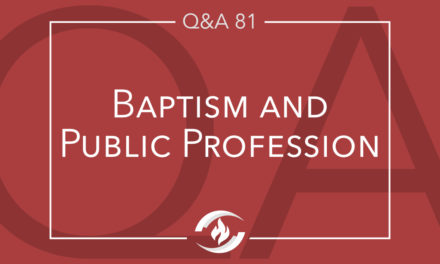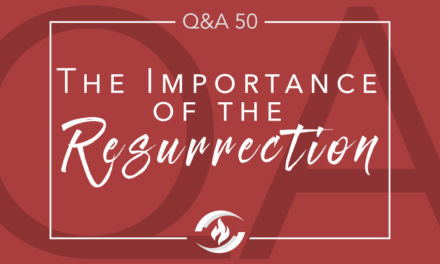Q.
Hi John,
I’ve recently subscribed to your blog and have appreciated your clear biblical teaching, particularly on defining repentance (Q#12 Repentance and Turning from Sin).
I have a question regarding false conversion. I presume you would agree experientially and biblically (Matthew 7:21-23) that there are many who profess to be followers of Jesus, but have not actually been born again. In the context of personal witnessing to one we fear may be an unsaved professing believer…
- Is it our duty to warn them to examine themselves?
- If so, what is the best way to do it in a gracious way that would not offend them if they are truly saved (or cause them to doubt their salvation)?
Thanks, and God Bless you brother.
Brent
A.
Hello Brent,
Thanks for the great question! Many wonder about this. There is such a thing as a false profession. Thankfully, there is also a way to carefully approach the matter.
Often, Matthew 7 is used to confront those who profess salvation but live obviously sinful lives. Interestingly, in that passage, those whom Jesus says He never knew are those who outwardly look good. They look righteous. They have done many wonderful works and have even cast out demons. So why were they not saved? Their basis of appeal was their own works instead of Christ’s finished work. The modern equivalent would be an unsaved moralist, whether they be Mormon, Catholic, Lutheran or Baptist. The problem is self-righteousness—the wrong object of dependence.
In discerning someone’s need, regardless of whether they appear righteous or not, the key is to focus on the Gospel. Focus on the object of faith. In contrast, focusing on the subject of faith (the individual’s prayer or performance) often causes confusion and unnecessary doubt. The key to faith is always the object, not the subject, of faith.
To establish a focus on faith’s object, examine the person’s understanding. Is there an understanding of the right facts? According to 1 Corinthians 15:3 and John 16:8, one must understand sin is the problem, judgment is the penalty, and Christ alone is the payment. Is this the case? Does the individual agree with these facts personally? And on that basis, has the person depended on Christ (the payment) to save from sin (the problem) and hell (the penalty)?
If examination shows the person (1) does not understand the necessary facts, (2) clearly understands but has not agreed with the facts, or (3) understands and agrees (i.e.: believes about Christ) but has not depended on Him (believed on Christ), then the person is not saved and needs to place trust in Christ as Savior.
An individual that understood, agreed, and depended on Christ, the Bible deems saved. When anyone believes on Jesus, that one has His eternal life (John 3:16; 6:47). Because the person is saved, some direction may be needed on how to grow in grace through the walk of faith so that practice might match profession and erase any doubts regarding salvation. In other words, the convert needs to be taught how to walk in the Spirit to live the Spirit-filled life.
John
We’d love to hear your thoughts on this subject in the comments section below! If you have a question on another subject, we welcome you to make a submission by clicking here:











This is a great issue in our “evangelized” world and even in our churches. People are professing a relationship with Jesus Christ, and yet their fruit is non-existent. 1John 2:2-3 remind us that it is Christ alone that gives us the relationship with the Father. That relationship manifests itself in obedience. Many times our doubts about others salvation are because there is a lack of good fruit or conversely a great manifestation of “Bad” fruit in their lives. Those in Matthew 7 are putting on a show of “Good Fruit” and I’m not sure we would ‘doubt’ their salvation. As… Read more »